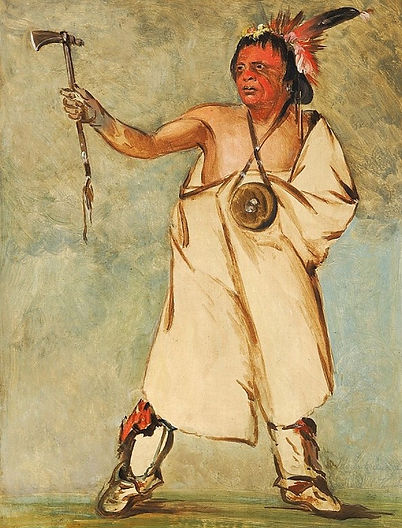
Mąnąpega (Mau-nah-pay-kaw)
Soldier
Variously identified in historic documents as Soldier and Little Soldier, Mąnąpega was an emerging young leader at the time of the 1832 census. He was born at the Black Wolf Point village on the shores of Lake Winnebago to the community's name sake, Black Wolf. His name is often confused and combined with that of a close associate who was also from the Lake Winnebago band, Dandy (Four Legs' nephew). However with both of their clan names appearing adjacent to each other on the treaty of 1832, their persons and their stories are distinct.
By 1828, Soldier had risen to leadership sufficiently to co-represent the Lake Winnebago delegation at Washington, D.C., along with Four Legs' nephew. In 1832, his household appears to have resided at Fond du Lac and was present at Rock Island (identified as Black Wolf's son, Soldier) during the treaty of that year. His home at the juncture of ancient trails which cut across the south end of Lake Winnebago placed him at the center of burgeoning land travel paralleling the well-traversed water route of the Fox River.
The accumulating events of the mid-'30s tied Soldier's life up in the very heart of his tribe's struggle with removal. By 1836, the territorial government doubled down on efforts to force the issue of removing the Hoocąk across the Mississippi.
In 1837, the Hoocąk consented to sending a delegation to discuss the issue in Washington, D.C., although the delegates were chosen so as not to constitute a body of land-holding authority to sign a treaty. Soldier once again was sent to Washington in company with One Eyed Decorah, Winneshiek, and others. The Hoocąk back in Wisconsin were astonished when the group returned with news of a treaty having been signed to cede the rest of Hoocąk land in Wisconsin.
Upon his return, Soldier confided with Dandy that there had been threats made against himself and his companions to force a signing. Although reports of underhanded tactics were substantiated by other sources, the outcome of the treaty remained unaltered. Little Soldier's story stands as a witness to the tragedies and injustices of the removal era. The remainder of his life is not well known, but he leaves behind an unforgettable illustration of the struggles which lay before his people as their names were registered for posterity in November, 1832.
.png)
